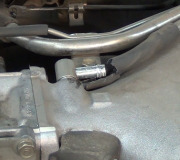When they took the engine apart, they found a lot of coolant on top of the piston in cylinder 1. So, they replaced the injector in cylinder 1, fixed a small leak in the coolant system (didn't say where), replaced the water pump because of the age of the car, replaced the wiring harness for cylinder 1 and did another tune up. The mechanic assured us that the coolant leak had been the problem and now that it was fixed that the car would be fine.
A few days later the check engine light came back on and the car began starting more roughly than it did before the work. We took the car back to the Ford dealer and were told, after the took the engine apart again, that we might have a cracked head gasket but that they were not sure of that and couldn't be sure unless they took the entire engine apart because as it was they could not see the gaskets. The mechanic recommended that we replace the head gasket or get a rebuilt engine. We could not afford to do either, so we asked them to put the engine back together and let us have it back. The mechanic told us that the car should work decently for 10,000 more miles, and then it would die.
That was 2 months ago. Since then we have tried not to drive the car more than necessary (though it does get driven everyday since it is our only car) and have tried to drive at moderate speeds. We did have to make a trip to Richmond, Virginia (about 4 hours each way from our house) and the car acted like it normally does for the entire weekend that we were out and about with it up there. The car starts roughly still, getting a little worse each week. Sometimes it takes 2-3 tries to get the car started. The exhaust smells rich, very much like gasoline or paint thinner. The car is not leaking any fluid on the ground.
The car has never overheated, and the thermostat always stays halfway between H and C (which baffles the mechanically inclined people that we know who say that if it is a cracked or busted head gasket it would constantly overheat). The gas mileage has improved somewhat since the last time we had the car in the shop. The car makes a strange knocking sound when we go up hills, being quite loud when the hill is steep and acting like it doesn't want to climb the hill at all if the hill is really steep. The air conditioner does not want to cool in the daytime if it is really hot outside but does fine if it is moderately hot or nighttime (again I am not sure that this is even related since the air conditioner has always given us trouble). The compressor also makes a hard thump sound once in a while when we turn the air conditioner on. Sometimes we smell what we assume are gas fumes when we turn air on after starting the car in our driveway, though we assume this is because we have the car backed up against a wall and this might be causing the exhaust to envelope the car somewhat.
We bought this car used a year and 3 months ago. The Carfax report said that the car was previously used as a leased car to a corporation in New York. The Carfax report said that the car had never been in an accident or damaged in any way, nor had it ever been stolen.
We do not have another car and I am a paraplegic that requires a wheelchair for all of my mobility, so making this car work well is really important to us for financial reasons and the safety of my health. Can you tell us what is wrong with our car?
SPONSORED LINKS
Tuesday, July 10th, 2007 AT 11:01 PM



